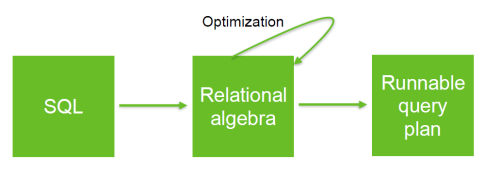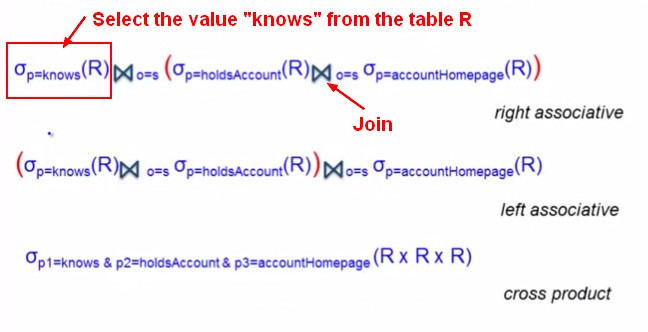Relational Algebra - Expression and Operators
About
Relational algebra is based upon the fact that you can pass tabular data through a set of data operators (select, filter, join, sort, union, etc.) in a algebraic structure.
It means that:
- the output of a tabular operation is in the form of tabular data
- and can be passed as input to the next tabular operation
- and so on.
It's the same than with mathematics algebra where the output of a mathematical operation a number can be passed to the next one. <MATH> 1 + 2 - 4 = -1 </MATH> The above expression can also be expressed in relational algebra if we see the tabular data as number. <MATH> \text{ table_1 } join \text{ table_2 } filter = \text{ table_result } </MATH>
Relational algebra is an extension to mathematical set theory (set operation), it was devised by E.F. Code (IBM) in 1970.
Advantage
Pipeline
Every query returns a table. The language is algebraically closed A view is stored as an algebraic closure so it can be optimized when used with queries.
Programs that manipulate tabular data exhibit an algebraic structure, therefore:
- All operations on a table return a table.
- The operation can then be chained (pipeline) together.
Relational algebra is about Data Flow focusing on transformations (relational operator)
Query Optimization
Translating a SQL into relational algebra defines an intermediate format for query planning/optimization.
where:
Information requests may be expressed using set notions and set operations.
Easy Verbs
Because Relational expressions (operator) process data, their names are typically verbs:
- Sort,
- Join,
- Project,
- Filter,
- Scan,
- Sample.
Merge with Sql Engine - Relational Operator (Data operations|Execution Plan Steps) ?
The what not the how
The SQL declarative language expresses only the conditions that must be met in order for a result to be an answer, not how to get that answer.
SQL is the what not the how. It's clear what we want unclear how to get it.
Relational algebra expressions dictate how to achieve an answer by giving what operations to do and in what order to do them.
It allows a reasoning and manipulation independently of physical data representation.
Order
By design, query results in relational algebra are unordered. Repeating the same query multiple times is not guaranteed to return results in the same order. Similarly, database-backed relational data also do not guarantee row order.
Column
The column names of an operator are guaranteed to be unique.
In case of name conflict, a suffix is generally applied. For example, joining EMP to DEPT in a SCOTT schema, will result in
- a column called DEPTNO
- and another called DEPTNO_1.
Relational Operator Algebra
All relational algebra operator are set-operator.
operator in Algebra.
| Type | Name | Symbol | Sql Operator | Description |
|---|---|---|---|---|
| Normal | select, Selection | <math>\sigma</math> of s | where | select the rows |
| Normal | project | <math>\pi</math> | select | select the columns |
| Normal | join | <math>\Join</math> | join | join |
| Normal | union | <math>\cup</math> | union (without duplicates) of union all (with duplicates) | union of tables - Tuples either in Rel 1 or in Rel 2 |
| Normal | intersection | <math>\cap</math> | minus or join | same row in two tables |
| Normal | Set-difference | - | except, minus | Tuples in Rel 1, but not Rel 2 |
| Normal | Rename | <math>\rho</math> | as | Rename an attribute or a relation |
| Extended | Grouping and aggregating | g | ||
| Extended | Duplicate elimination | d | ||
| Extended | Sorting | t | ||
| Extended | Division | / | find values that have all properties |
Bag vs Set
Relational Algebra has two semantics:
Rule of thumb:
- Every paper will assume set semantics
- Every implementation will assume bag semantics
Flow
| Input | Query Language | Output |
|---|---|---|
| Sets of Tuples | Set Relational Algebra | Set of Tuples |
| Bags of Tuples | Bag Relational Algebra | Bag of Tuples |
| Lists of Tuples | Extended Relational Algebra | List of Tuples |
Algebraic Optimization
Equivalent relational expressions with different costs
Library
Documentation / Reference
- Bill Howe, PhD (Director of Research, Scalable Data Analytics) University of Washington - eScience Institute

